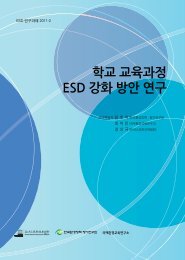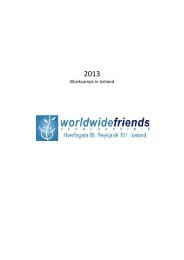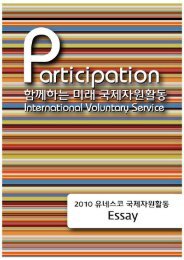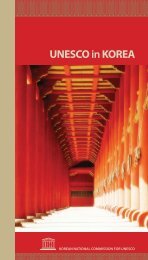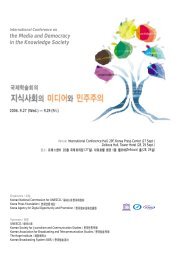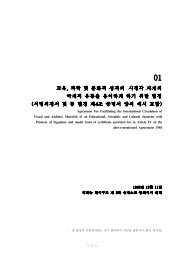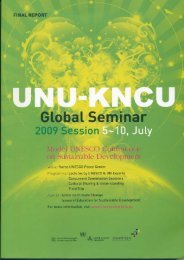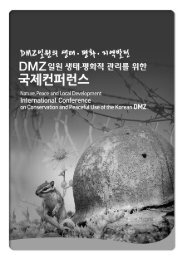íëìë³´ë2012문íì ë°ì ë¼ì´ëí ì´ë¸.pdf - ì ë¤ì¤ì½íêµììí
íëìë³´ë2012문íì ë°ì ë¼ì´ëí ì´ë¸.pdf - ì ë¤ì¤ì½íêµììí
íëìë³´ë2012문íì ë°ì ë¼ì´ëí ì´ë¸.pdf - ì ë¤ì¤ì½íêµììí
You also want an ePaper? Increase the reach of your titles
YUMPU automatically turns print PDFs into web optimized ePapers that Google loves.
Lynne Patchett was appointed Chief of Executive Office, UNESCO Culture Sector in<br />
November 2010. The Culture Sector focuses on promoting the role of culture for sustainable<br />
development and social cohesion; recognizing and promoting cultural diversity; and<br />
conserving culture in its various forms. Her previous responsibilities included working at the<br />
UNESCO Office of the Director-General, serving under both Irina Bokova and Koïchiro<br />
Matsuura, and the World Heritage Centre. Prior to joining UNESCO in 2001, her<br />
professional experience included working as a civil servant in the United Kingdom – dealing<br />
with a wide range of issues including local government reform, tourism, and media policy.<br />
Earlier in her career, she was a teacher at the Natural History Museum and at a number of<br />
inner city schools in London. She was born and brought up in Sheffield, UK and was<br />
educated at the Goldsmiths College, University of London and Rutgers University.<br />
Hendrik Van der Pol<br />
UNESCO Institute for Statistics<br />
<br />
<br />
<br />
<br />
<br />
<br />
<br />
<br />
<br />
<br />
<br />
<br />
Hendrik van der Pol, born in the Netherlands, has a degree in human geography and a<br />
doctorate in demography. He has collected and analyzed data from censuses, surveys, and<br />
registration systems in Africa, Asia, Latin America, and South Eastern Europe for the past 30<br />
years. This provided him with a valuable multicultural experience, as well as an in-depth<br />
knowledge in using quantitative methods in policy development, especially in developing<br />
countries. He was the Director of SNV, a Dutch development organization, in Albania (1993-<br />
1997) and Bolivia (1997-2000). In 2000 – 2004 he was a representative of the United Nations<br />
Population Fund (UNFPA) in Guatemala, where he was involved in the Guatemala 2002<br />
population and housing census. In 2004 – 2006, he was the UNFPA representative in India<br />
and Bhutan and managed the seven offices of the organization. Since April 2006, he has been<br />
working as the Director of the UNESCO Institute for Statistics in Montreal. He has written on<br />
various subjects such as population statistics, demography, migration, and reproductive health.<br />
He is a member of the International Union for the Scientific Study of Population and the<br />
Canadian Cultural Observatory Advisory Council.



